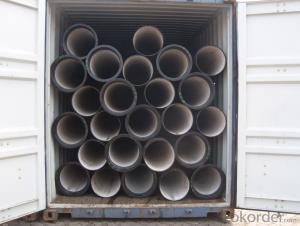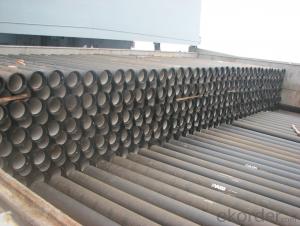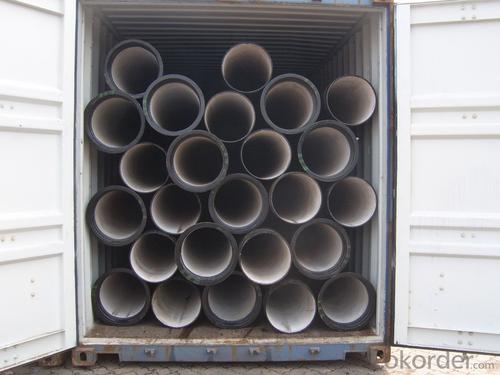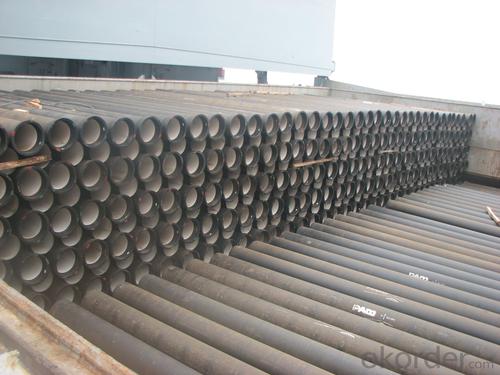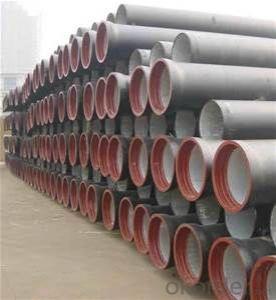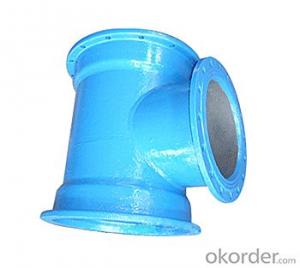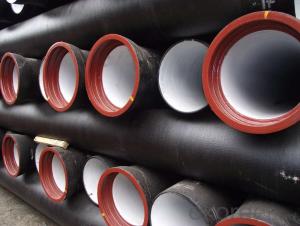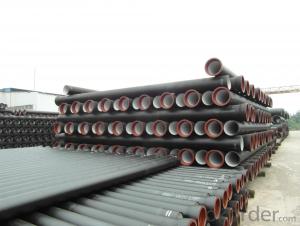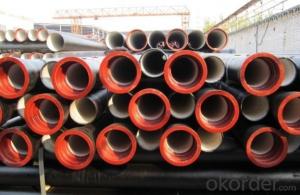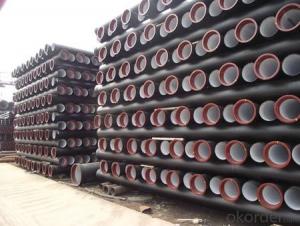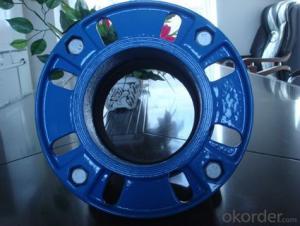Ductile Iron Pipe DN100-DN300 ISO2531:2009 for Water Supply
- Loading Port:
- China main port
- Payment Terms:
- TT or LC
- Min Order Qty:
- 20 m.t.
- Supply Capability:
- 200000 m.t./month
OKorder Service Pledge
OKorder Financial Service
You Might Also Like
1,Ductile Iron Pipe Description :
DI pipe fittings are manufactured according to ISO 2531 or BS EN545 or BS4772 FOR POTABLE WATER ,internal is cement lining or wet epoxy coating;External is zinc plus bitumen or wet epoxy coating. We also manufacture ductile iron fittings with fusion bonded epoxy both inside and outside.We have passed ISO9001,ISO14001,OHSMS18001 certificate.
2,Main Features of the Ductile Iron Pipe:
1).Quality guarantee
• Chemical checking
• NDE after rough machining
• Mechanical testing after heat treatment
2).Quality document
• Full Q.A document as per client request
3).Service
• Drawing: we can translate your original drawing, offer best suggestion on design
• Quality: we have full set quality control system to guarantee the best quality.
4).Packing and Shipping
• standard export package(carton/wooden case/pallet)
• accept FOB,FAS,CNF,CIF door to door etc or customer designated shipping agent
3,Ductile Iron Pipe Images:
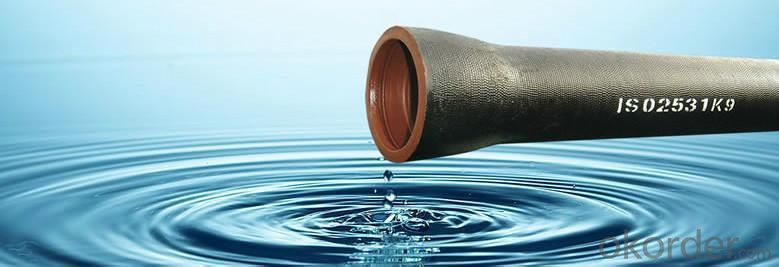
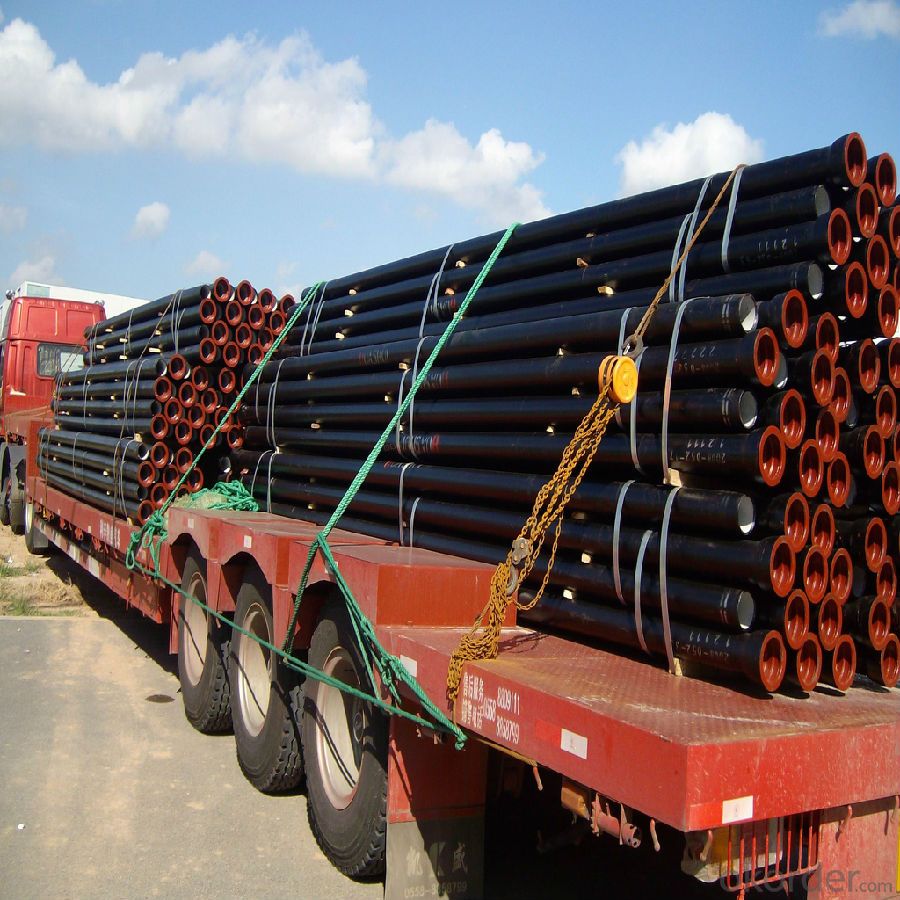
4. Ductile Iron Pipe Specification:
Surface Finishes: Bare, Oiled, Mill Varnish, Galv,FBE, FBE Dual, 3LPE, 3LPP, Coal Tar,Concrete Coating and Tape Wrap
Additional Services: Internal Coating
Packaging: packed in bag, plastic bag, steel strip, steel wire,double wire, iron box, wooden box, tarpaulin, plastic sheeting
Inspection: MOODY SGS BV GL DNV ABS LIOYD’S
Test: X-ray, UT, magnetic particle,inspection,hydrostatic test.
Processing service: Beveling, Threading, Slotting, Cut-to length, Bends, Quench and Temper, Fabrication, Double-jointing and On-site assistance
5.FAQ:
We have organized several common questions for our clients,may help you sincerely:
1.Q:Why can you guarantee the inner of pipes can’t be corroded?
A: High alumina cement mortar lining and sulphate-resistant cement mortar lining. These two special linings are applicable to inner anti-corrosion for sewage pipes, improving resistance to erosion of the sewage components.
2.Q: Why would you choose ductile iron pipe rather than other pipe materials?
A:The reasons are obvious for that not only ductile iron pipe possesses the inherent strength and flexibility of ductile iron, combined with proven corrosion protection systems, but also the cost savings can be achieved from design to installation and commissioning.
- Q: It's not easy to drill ductile iron with cobalt high speed steel bit. Please help to point it out
- Determine the authentic M35 cobalt bit, which is about 65HRC in hardness. General workpiece hardness of about 45HRC or less of the problem.
- Q: Can ductile iron pipes be used for stormwater management systems?
- Yes, ductile iron pipes can be used for stormwater management systems. Ductile iron pipes are known for their strength, durability, and corrosion resistance, making them suitable for handling stormwater runoff. They can effectively transport large volumes of water and withstand the pressure and impact associated with stormwater management.
- Q: Are ductile iron pipes suitable for use in mining applications?
- Ductile iron pipes are well-suited for mining applications due to their unique properties. Also known as nodular cast iron, ductile iron is a type of iron that has been modified with magnesium or cerium to enhance its microstructure, resulting in increased strength and flexibility compared to traditional cast iron. These enhancements make ductile iron pipes highly resistant to impact, corrosion, and abrasion, which are common challenges in mining environments. In mining applications, ductile iron pipes find multiple uses, including water supply, slurry transportation, and ventilation systems. Their exceptional durability and resistance to wear and tear make them ideal for handling abrasive materials, chemicals, and high-pressure fluids typically encountered in mining operations. Moreover, the ability of ductile iron pipes to withstand heavy loads and external pressures makes them suitable for underground mining, where they may need to support the weight of overlying rock layers. With their high tensile strength and flexibility, ductile iron pipes help prevent pipe failure and reduce the risk of leaks or breaks, ensuring the safety and efficiency of mining operations. Furthermore, ductile iron pipes are relatively simple to install, maintain, and repair. They can be welded or joined using mechanical couplings, allowing for quick and efficient installation at mining sites. Their corrosion resistance also minimizes the need for frequent maintenance and replacement, resulting in cost savings for mining companies. Overall, the superior mechanical properties and durability of ductile iron pipes make them a reliable and practical choice for mining applications.
- Q: Are ductile iron pipes suitable for desalination plants?
- Yes, ductile iron pipes are suitable for desalination plants. They possess excellent corrosion resistance and durability, making them ideal for transporting seawater and brine solutions commonly found in desalination processes. Additionally, ductile iron pipes have high tensile strength, allowing them to withstand the high pressure and fluctuating temperatures associated with desalination operations.
- Q: How is ductile iron pipe tested for quality?
- Ductile iron pipe is extensively tested for quality to ensure its performance and reliability in various applications. The testing process involves several steps to assess the physical and mechanical properties of the pipe. One of the primary tests conducted on ductile iron pipe is the hydrostatic pressure test. This test involves subjecting the pipe to fluid pressure higher than its designed operating pressure to determine its ability to withstand internal pressure without leakage or failure. The pipe is filled with water or another suitable fluid, and pressure is gradually increased to the required level. The pipe is inspected for any signs of leakage or deformation during this test. Another crucial test is the tensile strength test, which measures the pipe's ability to resist pulling or stretching forces. A sample of the pipe is pulled until it breaks, and the maximum force applied during the test is recorded. This test helps determine the pipe's ultimate tensile strength, yield strength, and elongation properties. Ductile iron pipe is also tested for its impact resistance through the Charpy test. This test involves striking a notched sample with a swinging pendulum to measure the amount of energy absorbed by the pipe. It helps assess the pipe's ability to withstand sudden impacts or loads without fracturing. Additionally, the pipe undergoes various non-destructive tests, including ultrasonic testing, magnetic particle inspection, and visual inspection. These tests help detect any internal or external defects, cracks, or abnormalities that may affect the pipe's structural integrity. Furthermore, chemical analysis and metallographic examination are performed to evaluate the chemical composition and microstructure of the ductile iron pipe. These tests ensure that the pipe meets the required specifications and standards for its intended application. Overall, the testing process for ductile iron pipe is comprehensive and rigorous, aiming to guarantee its quality, durability, and overall performance in delivering water, wastewater, or other fluids safely and efficiently.
- Q: Does the cast iron have size 250? What's the performance?
- 1, cast iron because of low melting point, casting process performance is good, because it has been widely used.2, the relative gray iron ductile iron, have higher tensile strength and impact toughness, which has better mechanical performance.
- Q: What is ductile iron?
- Ductile iron is a type of cast iron that has improved strength and ductility due to its unique microstructure. It is created by adding small amounts of magnesium to molten iron, which causes the graphite in the iron to form in a nodular shape rather than in flakes. This nodular graphite structure gives ductile iron its characteristic properties, making it more resistant to cracking and allowing it to be easily machined and welded. Ductile iron is widely used in various industries for its excellent strength, impact resistance, and durability.
- Q: What are the different types of valves available for ductile iron pipe?
- There are several types of valves available for ductile iron pipe, including gate valves, butterfly valves, check valves, ball valves, and globe valves.
- Q: Can ductile iron pipes be used in areas with high levels of groundwater contamination?
- Yes, ductile iron pipes can be used in areas with high levels of groundwater contamination. Ductile iron is highly corrosion-resistant, making it suitable for such environments. Additionally, these pipes have a long lifespan and can withstand external pressures, making them a reliable choice for transporting water in contaminated areas.
- Q: Can ductile iron pipes be used for pressure surge applications?
- Ductile iron pipes are suitable for pressure surge applications. Their excellent strength and durability enable them to handle surge pressures caused by sudden flow rate changes or water hammer events. These pipes can withstand high internal pressures and are highly resistant to impact and fatigue. Moreover, their smooth interior surface facilitates efficient fluid flow, minimizing the risk of pressure surges. However, it is essential to consider factors such as pipe size, wall thickness, and proper installation techniques to ensure safe handling of specific pressure surge conditions. Consulting a professional engineer or pipe manufacturer is advised to assess the suitability of ductile iron pipes for pressure surge applications.
Send your message to us
Ductile Iron Pipe DN100-DN300 ISO2531:2009 for Water Supply
- Loading Port:
- China main port
- Payment Terms:
- TT or LC
- Min Order Qty:
- 20 m.t.
- Supply Capability:
- 200000 m.t./month
OKorder Service Pledge
OKorder Financial Service
Similar products
Hot products
Hot Searches
Related keywords
